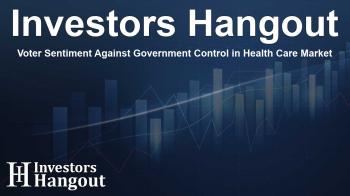Voter Sentiment Against Government Control in Health Care Market

Voter Sentiment Against Government Control in Health Care Market
Survey Indicates Strong Concern Among Voters About Policies That Could Increase Health Care Costs and Limit Coverage
In a notable recent survey of 1,200 likely voters, Americans for a Balanced Budget highlighted significant opposition to excessive governmental mandates and unnecessary regulations impacting the individual health care marketplace. Conducted by the reputable polling firm McLaughlin & Associates, the results revealed a striking consensus across different political affiliations.
Dee Stewart, President of Americans for a Balanced Budget, emphasized, "There is potential for significant improvements in the Big Beautiful Bill. Thanks to collaborative efforts, we are nearing a critical achievement for the American populace. Nonetheless, some policy areas require extensive review." He pointed out the need for flexibility and competitiveness in the individual health care marketplace, expressing concerns that the bill could impose arbitrary rules that harm consumers instead. This could lead to unwanted outcomes, including higher costs and destabilization.
In the eyes of voters, policies that threaten to increase health care expenses and jeopardize coverage are unequivocally unwelcome. Stewart continued, "It is essential for Congress to heed the messages from constituents and modify the Big Beautiful Bill accordingly. Residents value competition and flexibility, not added governmental restrictions that hike health care costs."
John McLaughlin, the CEO of McLaughlin & Associates, shared insights from the survey, stating, "This national survey underscores the strong bipartisan support for the Individual Health Insurance Marketplace. Ensuring its protection is not just sound policy for working-class Americans; it also serves as a strategic advantage for lawmakers. Those who undermine this marketplace risk facing serious accountability from voters."
From this survey, several key insights emerged:
Political Implications of Supporting Health Care Marketplace
The Positive Impact of Protecting the Individual Health Insurance Marketplace
- An impressive 81% of voters indicated they are more likely to support a candidate advocating for protection against escalating health care costs, with substantial backing from Trump supporters (83%), Republicans (84%), Democrats (81%), and Independents (78%).
- A strong majority (77%) expressed a preference for candidates who aim to sustain the Premium Tax Credit, thereby reducing costs and maintaining millions of Americans' health coverage. Support from Trump voters was 73%, Republicans 76%, Democrats 82%, and Independents 72%.
- Moreover, 71% recognized candidates who work to reduce issues of fraud in the health insurance sector, favoring those who resist costly governmental regulations and help citizens avoid higher expenses. Here, 84% of Trump supporters, 81% of Republicans, 63% of Democrats, and 69% of Independents showed their preference.
Consequences of Erosion in Health Care Policies
Political Fallout: Why Lawmakers Should Avoid Diminishing the Marketplace
- Should lawmakers choose to enact policies causing over 8 million Americans to lose their health coverage, 74% of voters would be less inclined to support them, including 64% of Trump voters, 67% of Republicans, 78% of Democrats, and 79% of Independents.
- Similarly, 74% indicated they would be less likely to endorse candidates who introduce new bureaucratic mandates to the health insurance landscape, which could destabilize coverage options and heighten expenses, with 66% of Trump voters, 67% of Republicans, 74% of Democrats, and 74% of Independents voicing strong opposition.
Voter Preferences: Encouraging Competition in Health Care
A Clear Preference for Market Flexibility Over Red Tape
- The survey revealed an overwhelming consensus (80% to 9%) favoring the protection of competition and choices in the marketplace, rejecting the addition of more bureaucratic regulations that could stifle consumer options.
Mclaughlin and Associates conducted this survey as part of a critical assessment regarding voter sentiments on health care policies, focusing on demographics reflecting the turnout model for the upcoming general elections. The margin of accuracy stands at +/- 2.8% within a 95% confidence interval, reflecting robust participation from a wide demographic range.
Frequently Asked Questions
What were the main findings of the survey conducted by McLaughlin & Associates?
The survey revealed strong bipartisan opposition to excessive mandates and regulatory burdens aimed at the individual health care marketplace.
Why do voters oppose increased government mandates in health care?
Voters believe that excessive mandates could result in higher health care costs, reduced choices, and less flexibility in the health care market.
What percentage of voters support protecting the Individual Health Insurance Marketplace?
A significant 81% of voters are more likely to support candidates who advocate for protections against health care cost hikes.
How do voters feel about the Premium Tax Credit?
77% of voters are more likely to vote for candidates who support maintaining the Premium Tax Credit to avoid increased health care costs.
What message do lawmakers receive from these survey results?
The results indicate that lawmakers must prioritize flexibility and competition in health care to remain accountable to their constituents, or risk losing voter support.
About The Author
Contact Hannah Lewis privately here. Or send an email with ATTN: Hannah Lewis as the subject to contact@investorshangout.com.
About Investors Hangout
Investors Hangout is a leading online stock forum for financial discussion and learning, offering a wide range of free tools and resources. It draws in traders of all levels, who exchange market knowledge, investigate trading tactics, and keep an eye on industry developments in real time. Featuring financial articles, stock message boards, quotes, charts, company profiles, and live news updates. Through cooperative learning and a wealth of informational resources, it helps users from novices creating their first portfolios to experts honing their techniques. Join Investors Hangout today: https://investorshangout.com/
The content of this article is based on factual, publicly available information and does not represent legal, financial, or investment advice. Investors Hangout does not offer financial advice, and the author is not a licensed financial advisor. Consult a qualified advisor before making any financial or investment decisions based on this article. This article should not be considered advice to purchase, sell, or hold any securities or other investments. If any of the material provided here is inaccurate, please contact us for corrections.

